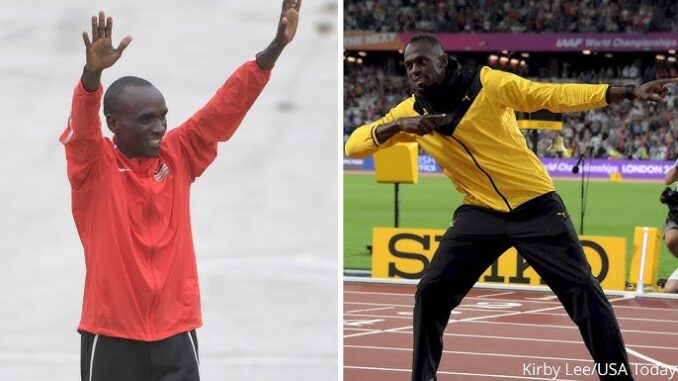
In a development that sent shockwaves through the global athletics community, Kenyan marathon legend Eliud Kipchoge, 41, has stirred major controversy after publicly criticizing Jamaican sprint icon Usain Bolt, 39. The two track titans, often celebrated as symbols of discipline and greatness, found themselves at the center of a heated storm after Kipchoge’s blunt remarks about Bolt’s recent appearance on social media.
The drama began when photos of Bolt enjoying a relaxed vacation in Montego Bay went viral — the eight-time Olympic gold medalist appearing noticeably out of shape, with fans joking about his “retirement belly.” While many took the images lightly, Kipchoge did not. The marathon king reportedly expressed disappointment, stating, “Usain Bolt has tarnished the image of world athletics. Champions must carry themselves like champions — even after retirement.”
Those words cut deep. For many fans, Kipchoge’s comment was unexpected and, to some, even disrespectful. Known for his calm and philosophical nature, Kipchoge has long been admired for his humility and discipline. But this time, his sharp criticism seemed to ignite a firestorm that transcended national borders and sports categories.
It didn’t take long for Usain Bolt to fire back. Within hours, the world’s fastest man took to X (formerly Twitter) and unleashed 21 fierce words that instantly went viral. His reply read:
“I ran for the world, smiled for the world, and now I live for myself. Mind your lane, marathon man.”
Those 21 words set the internet ablaze. The hashtag #MindYourLane began trending within minutes, with fans and athletes across the globe picking sides. Some defended Kipchoge’s remarks as a call for professionalism, arguing that global icons like Bolt carry lifelong responsibility as role models. Others saw Bolt’s response as a justified clapback — a reminder that after years of relentless training, the man who gave the world endless joy deserves peace and personal freedom.
Sports analysts quickly jumped into the debate. One Kenyan columnist noted that Kipchoge’s words “reflect an old-school philosophy — that greatness should be a lifelong performance.” In contrast, Jamaican commentators hailed Bolt’s response as “authentically Bolt — confident, bold, and true to his free-spirited nature.”
The incident reignited an age-old question in sports: Do legends owe the public their lifelong image? For Kipchoge, whose discipline defines him even in retirement, athletic greatness seems inseparable from personal lifestyle. For Bolt, whose charisma and joy carried millions through unforgettable moments, life after sprinting is about freedom, not appearances.
As fans debated, Bolt later shared another post — a smiling photo of himself at a family barbecue with the caption, “Still the fastest belly alive 😎.” The humor struck home, softening the tension and reminding everyone that beneath the medals and records, these men are human beings too.
While neither Kipchoge nor Bolt has issued further statements, their brief clash revealed the contrasting worlds of two of the sport’s greatest ever — one built on quiet endurance, the other on explosive joy.
In the end, the athletics world might have witnessed not just a feud, but a fascinating reflection of legacy, image, and identity — two champions, still running their own races, just on different tracks.
Be the first to comment